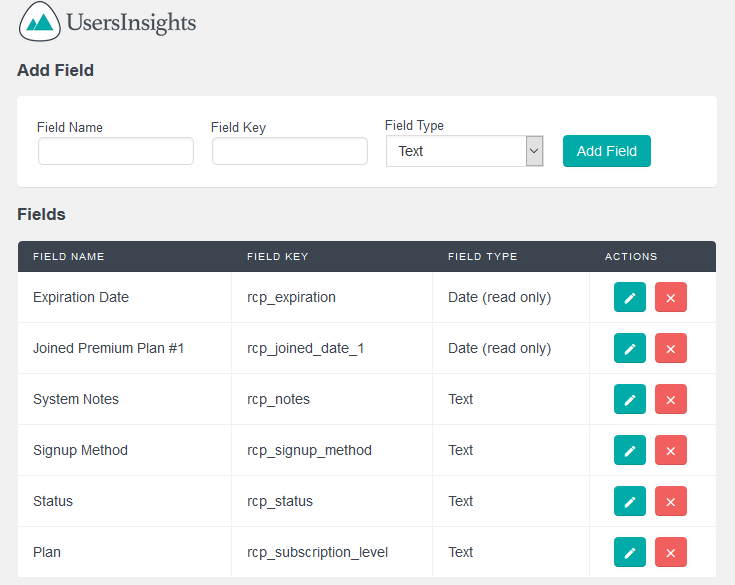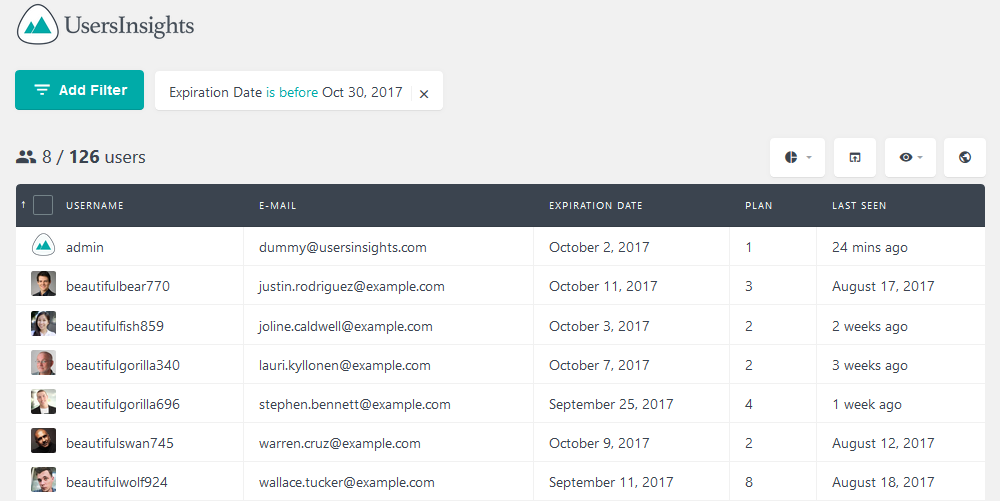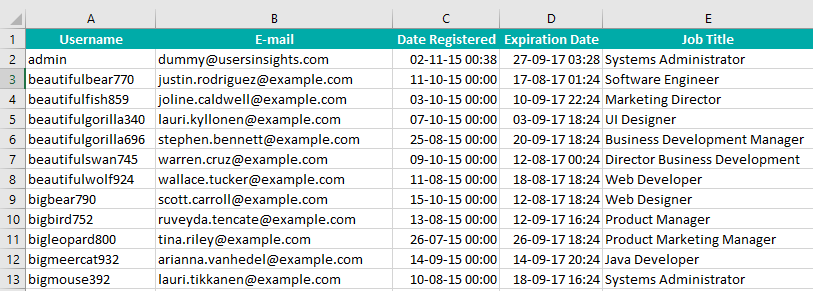How to search and filter your Restrict Content Pro member data
In this article we are going to show you how you can use the Users Insights plugin to search and filter your Restrict Content Pro member data. You will learn how you can filter your member list by their membership plan, expiration date and membership status. By the end of the day this should help you gain a better understanding of how your membership site is performing.
The Restrict Content Pro WordPress plugin is a great tool for filtering content for premium users and creating membership sites. When you use the Restrict Content Pro WordPress plugin you get a big suite of tools at your disposal. You can restrict content with shortcodes, so you can use it as a user access manager plugin. Overall this plugin works great for managing your users’ subscriptions and content delivery.
But when using Users Insights you can get a whole new understanding of your members’ profiles. In this article you’ll see different ways of filtering, organizing and exporting your users. Our main goals for today are:
- Mapping the Restrict Content Pro custom fields
- Filtering and ordering members by the plan they are subscribed to
- Filtering members by their membership status
- Filtering members by upcoming expiration dates
- Filtering members by location
- Exporting your Restrict Content Pro member data
Let’s get right into it!
Mapping the Restrict Content Pro custom fields
Most WordPress plugins store custom user information using user meta fields and the Restrict Content Pro plugin is no exception. And if you are using Users Insights, you can read virtually any information stored as custom user fields. In order to do that you just need to tell Users Insights what fields you want to use. We’ve described this process in our article about custom fields mapping.
So, in order to do that you need to go to Users Insights > Custom Fields. These are the custom fields you can map from the Restrict Content Pro plugin:
- rcp_expiration – This is the date when the membership expires. Make sure to map this field as date, so you can use the date-related fields.
- rcp_joined_date_1, rcp_joined_date_2 … – These are the joined dates for each membership plan. If you have 5 plans, for example you’ll have 5 different fields for that. This one has to be mapped as date as well.
- rcp_notes – System-related notes, we couldn’t find much use for it.
- rcp_signup_method – This field can store if a user has been manually subscribed. It can be Manual (admin created the subscription) or empty for all other cases (if they aren’t a premium user or if the user has signed up themselves).
- rcp_status – This field stores the different possibilities for the membership status, such as active, free, none, pending, cancelled, expired.
- rcp_subscription_level – This custom field stores the plan ID that this user is currently a member of.
And this is how the custom fields mapping looks like:

Filtering and ordering members by the plan they are subscribed to
With Users Insights you can easily filter your subscribers by their plan, so you can find which users are actual subscribers or which users are subscribed to a particular plan. The Restrict Content Pro WordPress Plugin doesn’t have a full list with your free and premium members all together, so you might find this feature very useful. You can find all users who have a subscription plan just by checking if that field is set.
Free users will have the ID of the free plan, and premium users will have the ID of the premium plan. You may also have users who are registered but aren’t in any plan, and they won’t be shown with this filter.

In a similar way you can easily find the users who are subscribed to a particular plan just by a applying a filer “Plan is {ID}”.
Filtering Restrict Content Pro members by membership status
With the status user field you can easily filter your subscribers list by their membership status. For example, finding the list with the members whose membership is expired is as simple as applying a filter “Status is expired”.

Filtering members by upcoming expiration dates
As we mentioned above, the Expiration Date field can show us the expiration date of each member’s subscription. Like the rest of the custom fields, you can easily sort and filter the user table by this column. In this way you can perform queries like finding the users whose membership is about to expire or the ones whose membership has just expired.

For instance, users who have an upcoming expiration are potential buyers, as their renewal can guarantee you more revenue for another period. So, it might be a good time to send them a good offer, or remind them of the benefits of their premium subscription.
Filtering subscribers by location
It’s possible to go way beyond the basic filtering, since we can combine different custom fields from different modules and plugins. In this way you’ll understand your subscriber profiles even better.
For example, just by using the Geolocation module, you can filter your users by location, country, region or city. In this way you can know how your subscriptions perform based on the members’ locations.

Exporting your Restrict Content Pro member data
In addition to checking the users lists, all the previous filtering methods can benefit from exporting your member data. The Users Insights export feature allows you to export a CSV file with your Restrict Content Pro users. This file will contain all the currently visible columns.
For example, you can export the users whose membership is about to expire in a CSV file and then send them emails using an external tool, such as MailChimp or Campaign Monitor. 
Here is how this data will look once exported:

The CSV files can be used in many applications, not just for import and exports. You could create reports and analyze your user profiles or check how each subscription plan is evolving. It’s possible to create multiple metrics and evaluate how your customers and your business is changing over time.
Conclusion
Today we saw how you can use Users Insights in combination with the Restrict Content Pro WordPress plugin for advanced user reporting. We saw many ways to filter through your premium member data, as well as different ways you can use this data later on.
By the end of the day you should be able to filter, export and combine member information from the Restrict Content Pro plugin.
We hope you enjoyed this article and see you again next time!
